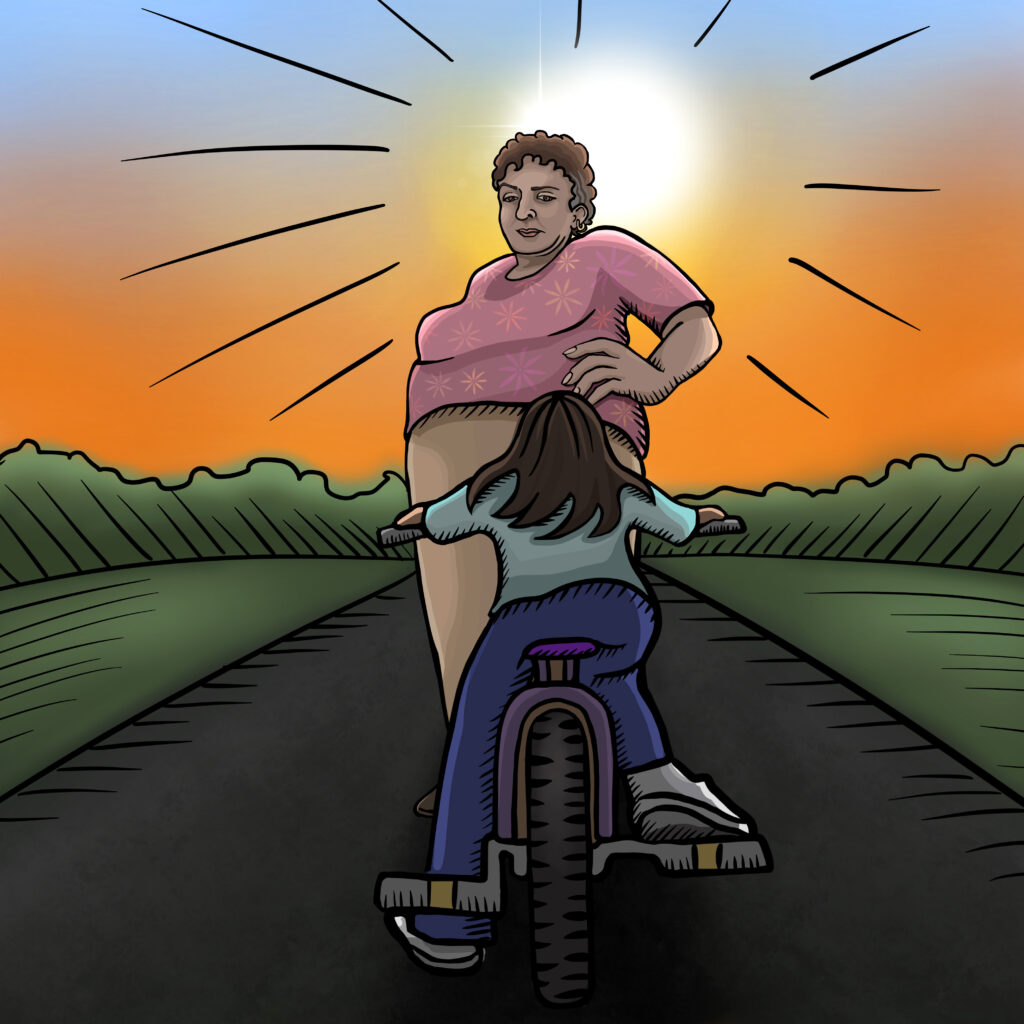
Frantic feet hurled my pedals forward as my bike rampaged toward the dead end of our street. The dead end was desolate and unmonitored, a lawless country perfectly suited for childhood misdemeanors like the kind I was about to commit. Our parents forbid us from riding our bikes in the street—it was sidewalks or nothing at all. But when life in those confines grew stale, the dead end was the portal to my own revolution. No one could see me there, so I’d ride my bike down the center of the street, just a bold fugitive and her purple banana seat.
Once I turned for home, I’d follow the same routine: about five houses away, I’d guide my bike back to the sidewalk, so no one knew of my crimes—least of all my parents. But one time, I overlooked one thing: my grandmother, standing in the street in front of my house, with her hands on her hips and her determined eyes burning holes through me and my felonious bike. I’d forgotten she was visiting that week and there were extra eyes on me. I couldn’t tell how long she’d been standing there, but she knew what I had done, and I knew that I was caught. The closer I got, the longer her shadow stretched, higher and higher until my whole world went dark. I had flown too close to the sun, and Gramma’s eclipse was my punishment.
My Gramma could eclipse the sun, because, if you ask me, she belonged in the sky right next to it. She was bold, proud, and full of integrity. You couldn’t pull the wool over her eyes; she had the kind of omniscience reserved for those directly from heaven. Visits to Gramma’s were a comfort, with a soft bed and cool, fresh sheets to land on while the smell of homemade bread wafted throughout her beautiful house. In the mornings, bacon crackled in the pan long before I woke up. I’d sit at her table and read copies of Star magazine. There was a crossword puzzle on the back page she filled out faithfully, and I’d check to see which answers stumped her. Not many, as her mind was always razor sharp. But I’d fill in any answers I knew. Then, I’d read tabloid headlines out loud to elicit a reaction from her. “Celebrities are all a bunch of crackpots,” she’d say, pushing down hard on that last word, so it was both a punctuation and an obscenity. Gramma didn’t mince words, and what she didn’t say with her mouth she said with her lethal side eye.
All these qualities made her a huge influence in my life. In college, I was constantly asked about dating and marriage—which was not my priority. As I told my siblings how annoying the questions were, Gramma stopped cooking and locked eyes with me. “You tell everybody you’ll get married when you’re good and ready, not a minute before.” I didn’t realize she was listening to us. I always wanted to do right by Gramma and was tickled by such fervent support.
Gramma saved her generosity for when I’d least expect it. During visits, she’d slip fifty bucks into my hand. “For you,” she’d say, and leave it up to me how to spend it. When I had a chance to go to the Bahamas, I stressed about not having enough money for the trip. One evening, my dad handed me an envelope. “Gramma heard about your trip and wanted to send you some spending money.” I hadn’t asked for anything, but in the envelope was more than enough to last the week. I was so relieved; I cried all the way home. My third morning in the Bahamas, I woke up early to watch the sun come up. Light waves brushed the beach, and the horizon was saturated in bright orange and pink, like sherbet in the sky. I sat on the balcony and soaked it in just one more time I looked into the sky and thought of Gramma.
Over this last year, Gramma’s health started to decline, so I visited as much as possible. As the first of these trips came to an end, I had a fleeting thought that this could be our last visit. I pushed it away immediately. Gramma must have read my mind, because she hugged me and very confidently said, “I’ll see you again.” She wasn’t planning on going anywhere yet. I was happy to hear that, yes, but I also knew her well enough to know what she was saying—she wanted me to visit again soon. Of course, I obliged.
My Gramma, my gatekeeper to the sun, passed away last month at the age of ninety-seven. Again, there’s a temporary shadow cast over my world.
But we need periodic reminders of life’s power and beauty, and that’s what an eclipse is. A forced examination of the splendor bestowed upon us when everything is bathed in light. I recall small details about my Gramma. How her voice lifted with every “Good Morning,” and how it cut through the air when she called me in for lunch. The traitorous shake of her shoulders as she tried to hide her laughter. The scent of powder that lingered after her shower. I’ll think of her when I smell homemade cinnamon rolls or see someone drinking a Michelob light. Every time I fold fitted sheets into a perfect, crisp square and compare them to hers. All these memories are receipts I’ve collected from a lifetime of paying attention.
The day she passed, an improbably brilliant sunset painted the winter sky orange and pink, just like that morning in the Bahamas. I knew right then I’d always have access to her magnificence, and her reassuring words echoed in my head: “I’ll see you again.”
Perhaps an eclipse is so spectacular not because of the darkness it brings to us, but because of its promise to return our light.
Views: 1




